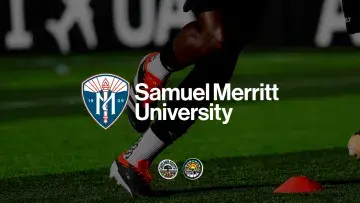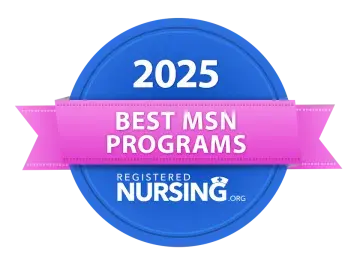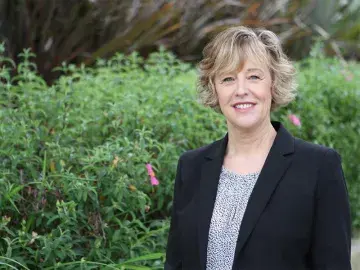BSN Grad Offers Advice to Other First-Generation Students
Mayra Jimenez completed her bachelor of science in nursing (BSN) degree this month at Samuel Merritt University. In the following Q&A, Jimenez shares her experiences as a first-generation college student and offers advice on what it takes to succeed.
What obstacles did you face in making it to the end of the BSN program?
Balancing work and going to school. Finding locations to study. I currently live at home in a one-bedroom apartment with my sister and mom in San Francisco. During the times where I was really struggling during the program, my older sister still lived in the apartment with us along with her daughter. My two sisters, the baby, and I all shared a room which meant being squished with no personal space to study because my mom was sleeping in the living room. I had no quiet time to focus on school and study. But even though my living situation is not the best, it is wonderful living with a group of people that are supportive of me and my choice in achieving my BSN.
In my first semester, I was failing classes because I had to work to afford my transportation to school and pay for books so I couldn’t study when I needed to. My drive and positive attitude allowed me to continue in the program without failing my courses.
What kind of support did you receive that helped you to succeed?
I received financial support from Samuel Merritt to help me pay for school, which in turn relieved a great amount of stress that comes with working full time and being a student. The financial assistance allowed me to put more focus on school and cut down to working part time. I also received support from the Office of Diversity and Inclusion. If it weren’t for Ché Abram (associate director of diversity) connecting me with a BSN alumna tutor by the name of Enabit Gebremariam, I academically would have not been able to make it through the nursing program. Enabit helped me with the academics and was also a great mentor and positive person to speak to about my problems. Katherine Leroy (academic support coordinator) also helped me grow in my test-taking skills.
What does it mean to you to be a first-generation college graduate?
It is an amazing feeling being a first-generation college grad. My hard work is possible because I have an amazing support system behind my success. My mother never went to college; she only has a high school diploma. College was not an option for her because my grandma never had the finances to afford for her to go. My grandma was brought to the U.S. to be a housekeeper for a wealthy family who paid for her and my mother to come from El Salvador. I chose to follow the pathway of having an education so I would be able to get a job that would allow me to financially assist my grandma and mother in their lives so they can cut back on their work.
My degree is a representation of my knowledge. Regardless of my background and the struggles I’ve faced, my achievement is a symbol that I am hardworking, that I have a drive to learn, that I am powerful as a young Latina. I want my degree to show that anyone can be a college grad regardless of where they come from. If finances are stopping you from going to school, know that there are people who want to see you succeed and will do what they can to make that happen. I want to lead by example and be a role model to girls that have the same experiences as myself, and to believe that there is a chance for everyone to achieve a college degree.
How did you balance school and life?
A day planner helped me balance my workload by marking down times to study. When I was at school during my breaks, I did homework instead of eating lunch so that I wouldn’t have to worry so much about it when I got home. I really did not have any social life during nursing school because either I was at school, performing clinical rotations, or working. I had a mindset that school was only going to last for two years and I would be able to have a social life or do more self-care when I was finished.
How were you able to afford school?
Private loans, government loans, as well as grants, especially the NWD (Nursing Workforce Diversity) grant that was awarded to me by the Office of Diversity and Inclusion, with the support of Dr. Paulina Van (nursing professor) and Ché Abram.
What is the most important advice you can give to a future BSN student?
Self-care is very important. Get enough sleep. Make sure that you eat. Take some time for yourself to do things that make you happy and not add to stress. If you find yourself struggling at the beginning of nursing school, utilize the great resources that the school provides such as academic support, the counseling center where you can talk to someone, and instructors/faculty who can offer academic advice. Find a group of friends that are supportive of you and are willing to listen.
Why did you choose a BSN Degree?
Nurses are people who love to help and care for people when they are at their lowest points in their lives as well as care for them when they are sick or are in need of someone to talk to. I want to be a nurse who makes a positive impact on a person’s life. People will have their experiences in a hospital that may not be great, but they will always remember the nurse that made their experience better. I want patients to remember the physical and mental care that I provide.
Another reason why I chose to become a nurse is that many people in the Hispanic community or those who are minorities often do not feel comfortable going to hospitals or doctors’ offices because of their finances, lifestyles, or choices they’ve made. Many people feel that they will be judged because of that. As a nurse, it is not my duty to judge. I want to be able to provide patients with comfort and care regardless of their background. I want to build rapport with patients so that they feel comfortable to receive the care that is necessary to prevent illness from happening or progressing. Many cultures do not trust Western medicine, but I want to be that first step where people begin to trust the healthcare system.


